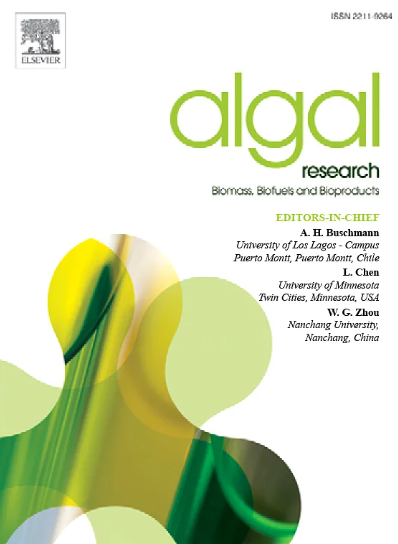Mechanical characterization of algal cultivation systems for enhanced mass transfer
IF 4.6
2区 生物学
Q1 BIOTECHNOLOGY & APPLIED MICROBIOLOGY
Algal Research-Biomass Biofuels and Bioproducts
Pub Date : 2025-04-08
DOI:10.1016/j.algal.2025.104032
引用次数: 0
Abstract
Mass transfer limitations pose a significant barrier to the industrial-scale deployment of algal cultivation systems, hindering efficient nutrient and gas exchange critical for applications in biofuel production, wastewater treatment, and carbon sequestration. This review aims to address this challenge by systematically evaluating mechanical strategies to enhance mass transfer, offering a novel integration of fluid dynamics, transport phenomena, and process engineering principles tailored to algal biotechnology. Unlike prior studies emphasizing biological or biochemical aspects, this review uniquely focuses on mechanical methods—stirring, bubbling, paddlewheel systems, and photobioreactor design—quantitatively assessing their impact on mass transfer optimization. Through mathematical modeling and empirical case studies, this review demonstrates that mechanical enhancements can increase mass transfer coefficients by 30–60 %, with innovative systems like rotating membranes reducing energy consumption by up to 90 % compared to conventional approaches. However, scale-dependent flow dynamics present persistent challenges, with transfer efficiency declining by 30–60 % from laboratory to industrial scales without adaptive design adjustments. This review bridges mechanical engineering and algal biotechnology, providing a robust analytical framework supported by predictive models and validated data to overcome mass transfer barriers. These findings underscore the potential for mechanically optimized systems to improve scalability and economic viability, advancing algae-based technologies toward sustainable industrial solutions. By addressing a critical research gap, this review offers actionable insights for researchers and engineers seeking to enhance algal productivity across diverse applications.

增强传质的藻类培养系统的力学特性
传质限制是工业规模应用藻类培养系统的重大障碍,阻碍了生物燃料生产、废水处理和碳封存等应用所需的高效养分和气体交换。本综述旨在通过系统评估增强传质的机械策略来应对这一挑战,并针对藻类生物技术对流体动力学、传输现象和工艺工程原理进行了新颖的整合。与之前强调生物或生化方面的研究不同,本综述独特地关注机械方法--搅拌、鼓泡、桨轮系统和光生物反应器设计--定量评估它们对传质优化的影响。通过数学建模和实证案例研究,本综述表明机械增强技术可将传质系数提高 30-60% ,与传统方法相比,旋转膜等创新系统可将能耗降低高达 90%。然而,与规模相关的流动动力学带来了持续的挑战,如果不进行适应性设计调整,从实验室到工业规模,传质效率会下降 30-60%。本综述将机械工程与藻类生物技术相结合,提供了一个由预测模型和验证数据支持的强大分析框架,以克服传质障碍。这些发现强调了机械优化系统提高可扩展性和经济可行性的潜力,从而推动基于藻类的技术朝着可持续工业解决方案的方向发展。通过解决关键的研究空白,这篇综述为寻求在各种应用中提高藻类生产力的研究人员和工程师提供了可行的见解。
本文章由计算机程序翻译,如有差异,请以英文原文为准。
求助全文
约1分钟内获得全文
求助全文
来源期刊

Algal Research-Biomass Biofuels and Bioproducts
BIOTECHNOLOGY & APPLIED MICROBIOLOGY-
CiteScore
9.40
自引率
7.80%
发文量
332
期刊介绍:
Algal Research is an international phycology journal covering all areas of emerging technologies in algae biology, biomass production, cultivation, harvesting, extraction, bioproducts, biorefinery, engineering, and econometrics. Algae is defined to include cyanobacteria, microalgae, and protists and symbionts of interest in biotechnology. The journal publishes original research and reviews for the following scope: algal biology, including but not exclusive to: phylogeny, biodiversity, molecular traits, metabolic regulation, and genetic engineering, algal cultivation, e.g. phototrophic systems, heterotrophic systems, and mixotrophic systems, algal harvesting and extraction systems, biotechnology to convert algal biomass and components into biofuels and bioproducts, e.g., nutraceuticals, pharmaceuticals, animal feed, plastics, etc. algal products and their economic assessment
 求助内容:
求助内容: 应助结果提醒方式:
应助结果提醒方式:


